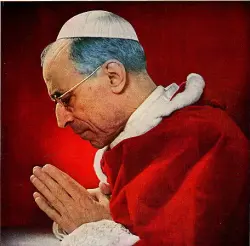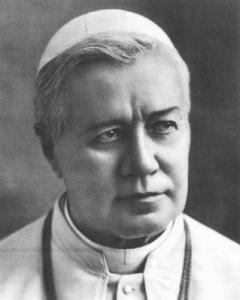The Unsung Heroes
We live, thankfully, in times when Catholicism is giving timid but clear signs of recovery. The Internet was, if you ask me, the starter engine of such movement. The Internet allowed more and more people to understand that they are not alone and that the dumbing down of Catholicism and its reduction to a bunch of slogans for kindergarten children caused suffering to many others.
The rest came from there; the amount of books available, and of traditional Catholic sources directly on the internet, would have been inconceivable only a few years before. If you were born in Italy or France or Germany a couple of dozen years ago, either you were really angry or the mainstream outlets (the popular book stores, and so on) would not have given you any alternative to the blandness and effeminacy of the Vatican II/Assisi/pacifist/social justice crowd.
The Internet changed all this, and with the increase in conservative Catholicism came a wave of reprints. Fulton Sheen, Ronald Knox and many others were made available again, and today your kindle (a wonderful invention, Kindle) would allow you to store more Catholic knowledge than most wealthy Catholic would have in their libraries in centuries past, effortless and at low-cost. You can bet your pint the process will continue, and will continue to change the way the common Catholic sees the Church.
Still, it was not always so. Think of what it must have been for a middle-aged person in the Sixties to be surprised by such a tsunami of changes. To them, it must not have seemed a momentary folly. To them – particularly if not robustly educated; probably even in that case – it must have seemed irreversible. The Church itself said to them – in all possible ways – that the Church had changed, and this showed everywhere, not only in the Mass but in the mentality, the demeanour, even the clothes of the priest, the robust wine of salvation now substituted for a bland soft drink smelling, mainly, of sugar.
How difficult it must have been for those who have decided they wouldn’t stand for it. A tiny minority, derided and insulted, considered obsolete dreamers in their dotage, unable to see the luminous new path the Holy Spirit would – obviously changing his mind, but laissons tomber – now show to the renewed Church.
I think here not only of the few religious who had the gut to say “no” to the madness (Archbishop Lefebvre obviously comes to mind; but let us not forget staunchly conservative churchmen like the Abbe’ de Nantes, and the monasteries who simply refused to obey to the diktat of “change”), but particularly of the laymen. Romano Amerio was vilified and mocked for a book now read all over the world, and whilst all around him priests were surrounded by guitars it must have been very bitter to see two thousand years of Christianity almost crumble under a wave of such immense stupidity.
I also think of the many old people who were literally overcome – or I should say: run over – by the tidal wave of “change” of the Sixties and Seventies; old, frail, often poor people for whom their simple faith was the main comfort in their last years, and trying to march toward salvation in the company of accustomed values, and rites. How they must have suffered!
If they were alive today, they would at least know that the counter-charge has now started and will soon be in full swing. They would look into the future and see hope of improvement; nay, they would see improvement is in time unavoidable. But how could they in those dark years, when the “renewal” was imposed on them by the same priests who assured the Holy Ghost was tirelessly working on the destruction of all they held dear!?
They are, of course, all gone now. Gone is Archbishop Lefebvre, gone is the Abbe’ de Nantes, gone is Rosario Amerio, gone are all those old people I imagine crying in their kitchen after hearing the guitars at mass. I think of them, and cry. A person can cope with a lot, if he has faith. Think how many of them had gone with as much serenity as they can – and as much faith as they could muster – through wars and loss of their most beloved ones, even in the hardest moment resting against the wall of their faith. Picture them now in their Seventies, with their religious system and philosophy of life put upside down, and restless adolescents with long, unwashed hair and jeans strumming their guitars in the church under the approving eye of the young, not-so-manly priest.
It was a huge shock for me the first time I heard guitars in the church, and I was only ten years old. For a seventy years old, it must have been the end of the world as we know it.
The unsung heroes are now being vindicated. The public figures are rising high in the consideration of the posterity after having been derided by their contemporaries. The common people are, at least, pitied in their suffering they were, were probably, not even allowed to utter.
Dear reader, every now and then, please think of for the old couple who was crying in the kitchen; of the war widow informed there would be no vespers anymore as apparently the Holy Ghost doesn’t like that now; of the old woman who lost her boy in the war and was told Mass would now be in English, with a chap talking to the congregation as if he was their pub buddy; and with the guitars, the guitars! Think of the old scholars vilified like Romano Amerio, and the old churchmen belittled or even excommunicated.
When you can, please say a prayer for the unsung heroes.
Mundabor
Posted on April 9, 2012, in Catholicism and tagged "Spirit of Vatican II", Abbe' de Nantes, Archbishop Marcel Lefebvre, Romano Amerio. Bookmark the permalink. 3 Comments.























A moving and powerful call to prayer and to arms, to which I can say only a humble AMEN.
I too weep for the old, poor, humble, devout, despised people who lost the means of a fitting expression of their Faith. I trust that Almighty God understands why they, perhaps, fell away and lost hope.
Thank you and God bless!
Thanks, Leftfooter,
I rather hope the Lord gave them special bonus points at death, for having had to endure so much. I doubt many lost people lost faith, though I can imagine more than a couple not being able to endure the Novus Ordo, particularly if in the most virulent tambourine form.
I sometimes wonder what I would do if the mess were to explode again. I think I woul dbe able – as long as I can – to travel very far to attend at an SSPX chapel, and would try to suffer the weekly horror if I had – for health or economic or other reason – no alternative.
I was in Bruges in October and frankly, I think I in that situation I would develop doubts about the validity of that mass anyway.
M
Thanks, Catocon, corrections made!
M